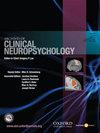A - 27 A Preliminary Investigation of the Relationship between Sleep Symptoms and Post-Concussion Cognitive Performance in Adolescents
IF 2.1
4区 心理学
Q2 PSYCHOLOGY
引用次数: 0
Abstract
To explore the relationship between self-reported sleep symptoms and post-concussion cognitive test performance in adolescents on Immediate Post-Concussion Assessment and Cognitive Testing (ImPACT). 54 adolescents (ages 12–16) referred to a specialized sports concussion private practice completed post-concussion ImPACT. Five symptom clusters were derived from the post-concussion symptom scale: sleep, physical, cognitive, affective, and headache. Two-factor cognitive composites from the ImPACT (memory and speed) were the outcome variables. Multivariate linear regression was conducted to examine the relationship between cognitive variables and sleep symptoms. Post-hoc forward stepwise linear regressions were used to explore the following potential additional predictors of cognitive outcomes: age, number of previous concussions, sex, hours slept the night before, and five symptom clusters. Sleep symptoms were significantly associated with cognitive performance, F(1,52) = 9.95, p < 0.001, ƞ2 = 0.28. Higher sleep symptom cluster scores were associated with worse memory, F(1,53) = 13.68, p < 0.001, ƞ2 = 0.21, and speed performance, F(1,53) = 17.84, p < 0.001, ƞ2 = 0.26. Results of post-hoc forward stepwise linear regressions revealed that a final model for speed performance included only the sleep symptom cluster, explaining 16.6% of the variance. The final model for memory performance included only the headache rating, explaining 20.1% of the variance. Our results indicate that severity of self-reported sleep symptoms post-concussion are associated with cognitive performance in domains of memory and speed. After considering additional predictors, more severe sleep symptoms were significantly associated with worse speed performance and worse headache severity was significantly associated with memory performance.A - 27 青少年睡眠症状与脑震荡后认知能力之间关系的初步调查
探讨青少年自我报告的睡眠症状与脑震荡后即时评估和认知测试(ImPACT)认知测试成绩之间的关系。 54 名转诊至专业运动脑震荡私人诊所的青少年(12-16 岁)完成了脑震荡后 ImPACT 测试。从脑震荡后症状量表中得出了五个症状群:睡眠、身体、认知、情感和头痛。结果变量为 ImPACT 的双因素认知复合量表(记忆和速度)。为研究认知变量与睡眠症状之间的关系,进行了多变量线性回归。采用了事后向前逐步线性回归的方法来探究认知结果的以下潜在附加预测因素:年龄、既往脑震荡次数、性别、前一晚的睡眠时间以及五个症状群。 睡眠症状与认知表现明显相关,F(1,52) = 9.95,P < 0.001,ƞ2 = 0.28。睡眠症状群得分越高,记忆力越差,F(1,53) = 13.68,p < 0.001,ƞ2 = 0.21;速度表现越差,F(1,53) = 17.84,p < 0.001,ƞ2 = 0.26。事后向前逐步线性回归的结果显示,速度成绩的最终模型只包括睡眠症状群,解释了 16.6% 的方差。记忆表现的最终模型仅包括头痛评分,解释了 20.1%的方差。 我们的研究结果表明,脑震荡后自我报告的睡眠症状严重程度与记忆和速度领域的认知表现有关。在考虑了其他预测因素后,更严重的睡眠症状与更差的速度表现显著相关,而更严重的头痛程度与记忆表现显著相关。
本文章由计算机程序翻译,如有差异,请以英文原文为准。
求助全文
约1分钟内获得全文
求助全文
来源期刊
CiteScore
4.60
自引率
7.70%
发文量
358
审稿时长
6-12 weeks
期刊介绍:
The journal publishes original contributions dealing with psychological aspects of the etiology, diagnosis, and treatment of disorders arising out of dysfunction of the central nervous system. Archives of Clinical Neuropsychology will also consider manuscripts involving the established principles of the profession of neuropsychology: (a) delivery and evaluation of services, (b) ethical and legal issues, and (c) approaches to education and training. Preference will be given to empirical reports and key reviews. Brief research reports, case studies, and commentaries on published articles (not exceeding two printed pages) will also be considered. At the discretion of the editor, rebuttals to commentaries may be invited. Occasional papers of a theoretical nature will be considered.

 求助内容:
求助内容: 应助结果提醒方式:
应助结果提醒方式:


